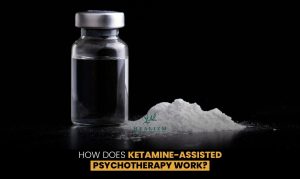
Ketamine has shifted from a depressant to a treatment that uplifts.
Now, when used with therapy, it brings hope for serious mental health issues. This is known as ketamine-assisted therapy, which helps with depression, anxiety, and PTSD.
In psychotherapy, ketamine uncovers novel approaches to restoration. It’s especially in demand by those who haven’t succeeded with other treatments.
For many, this method has been a turning point. It has combined drugs and therapy, with great success.
Let’s look into “How does ketamine-assisted psychotherapy work?”
Healizm‘s therapists are ready to help you. Don’t let depression or anxiety command your reality. Take the first step to feeling better. Book your first session today.
What Is Ketamine-Assisted Therapy?
To start, let’s discuss ketamine-assisted therapy. Next, we’ll inquire, “How does ketamine-assisted psychotherapy work?” This therapy brings out hidden emotions.
It makes treatments more effective. In small doses, it helps people face painful memories safely. The feelings of detachment and altered awareness aid in exploring tough emotions.
Known as KAP, this method improves therapy. It taps into deep psychological areas, aiding healing and self-discovery.
Benefits of Ketamine-Assisted Psychotherapy
Ketamine-assisted therapy offers numerous advantages, such as:
- Rapid Relief: Ketamine differs from usual antidepressants. It offers quick relief. While usual medications take weeks to work, ketamine can reduce symptoms in hours or days.
- Access to Deep Emotions: Ketamine-assisted therapy taps into deep emotions. It empowers patients to face pain, going beyond traditional therapy. This method reveals the mind’s hidden aspects. It achieves breakthroughs where standard approaches fail.
- Reduced Symptoms: KAP effectively reduces depression, anxiety, and PTSD. Patients often feel better after treatment. Its success in easing mental health issues has attracted doctors and those seeking help.
- Holistic Approach: Ketamine, combined with counseling, creates a full therapy experience. This method boosts treatment by tackling both mental and physical health.
How Does Ketamine-Assisted Psychotherapy Work?
Ketamine-assisted psychotherapy uses the drug to “reset” brain pathways. This offers hope to those with negative thoughts. It increases glutamate, enhancing brain flexibility and mood.
The drug’s dissociative effects provide emotional distance. This allows patients to see problems in greater detail. The therapy helps break patterns in depression, anxiety, and PTSD.
Researchers are still studying how it works. But ketamine seems to help in developing healthier thoughts.
In guided sessions, patients process emotions better, easing long-term psychological burdens.
What Is a Ketamine Session Like?
In a typical ketamine therapy session, the patient receives ketamine via one of these methods:
- Intravenous (IV) infusion
- Intranasal spray
- Oral form
Effects kick in within minutes. Patients often feel detached, as if watching themselves. This state helps them face tough emotions or memories without being overwhelmed.
Patients often listen to calming music, which can enhance the experience.
This brings us to the topic of the best music for ketamine therapy. Meditation playlists or soft, ambient sounds can enhance the session.
Patients stay conscious but are deeply relaxed. This makes it easier to access hidden emotions. After 40-60 minutes, ketamine’s effects fade.
Then, a therapist comes in. They discuss insights and emotions, helping patients process the experience. This vital phase adds time, making the session last 1-2 hours.
What to Expect After Ketamine-Assisted Therapy?
After ketamine therapy, people have different experiences as they adjust.
Immediate Effects
Right after the session, you might feel:
- Tired
- Deep in thought
- More emotional
Some might also have mild dissociation, drowsiness, or nausea, which fade within hours.
Short-Term Experiences
In the next few days, many noticed:
- Clearer thinking
- Emotional relief
- Fewer symptoms of depression, anxiety, or PTSD
It’s common to feel reflective as the brain processes the therapy’s effects.
Follow-up care, like integration sessions, is key to maintaining benefits and insights.
How to Prepare for Ketamine-Assisted Therapy?
Proper preparation improves ketamine therapy benefits. Careful steps beforehand lead to deeper, transformative sessions. Mindful preparation allows patients to fully engage in this innovative treatment. Here are some tips:
- Consult with Professionals: Before using ketamine, talk to your doctor about drug interactions. Also, review your prescriptions for safety and effectiveness.
- Create a Comfortable Environment: Make a calm space for therapy. A favorite blanket or playlist can turn any area into a personal refuge. Design it to promote relaxation and safety, paving the way for healing.
- Stay Hydrated: Hydrate well before your session. It will prime your body for peak performance.
- Avoid Alcohol and Drugs: To make ketamine work best, avoid alcohol and drugs 24 hours before your session. This short break boosts the treatment’s power.
Ketamine-Assisted Therapy Groups
In group therapy, ketamine patients find comfort and connection. They share their stories, building a sense of community. This reduces the isolation often felt in mental health issues.
The approach offers medical benefits and creates support, improving the healing process.
Conclusion
To sum up, how does ketamine-assisted psychotherapy work? This therapy mixes ketamine with counseling.
It helps break mental blocks and offers new views on psychological issues. Ketamine’s effects enhance the therapy sessions.
It gives hope to those with mental health issues, disrupting harmful thoughts. Many find it life-changing, gaining insights into their issues.
Yet, it’s vital to speak with a healthcare expert first. They determine if it’s right for you and explain the benefits and risks.
FAQs
Q: How many Ketamine therapy sessions do I need?
Treatment duration varies. Some need short care, others longer. Individual needs and conditions determine session frequency and length. It can range from a few to many over time.
Q: Is Ketamine-assisted treatment safe?
Ketamine care is supplied by trained individuals in safe settings. It could suit some, but not everyone. A professional assessment is needed before starting treatment.
Q: How does Ketamine-assisted therapy assist in alleviating depression?
Ketamine offers fast relief. It works quickly, unlike slow antidepressants. It targets NMDA receptors in the brain. This new method gives hope to people with hard-to-treat depression.
